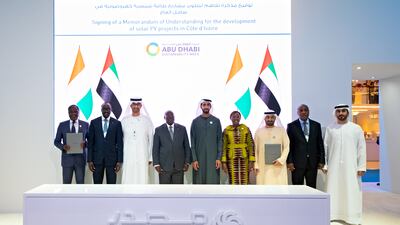Abu Dhabi's clean energy company Masdar has signed an agreement with the Ivory Coast to explore the development of a solar power plant.
Masdar and the Ivory Coast’s Energy and Mining Ministry will look at jointly developing solar photovoltaic plants in the West African country, starting with a project with a capacity that is between 50 megawatts and 70MW, the company said on Friday.
“With Africa’s massive projected development and growth, and low current clean energy penetration levels, we see enormous potential for the renewable energy sector across the continent,” said Masdar chief executive Mohamed Al Ramahi.
“This agreement will support [the Ivory Coast's] clean energy goals and help to drive sustainable economic development for the nation.”
The West African country aims to produce 45 per cent of electricity from clean energy sources by 2030.
The deal is a part of the UAE’s “Etihad 7" programme, which seeks to finance renewable energy projects in Africa, with the aim of reaching a capacity of 20 gigawatts by 2035.
In January, Masdar signed agreements with three African countries to develop renewable energy projects with a combined capacity of up to five gigawatts.
Last year, it signed an agreement with the Tanzania Electric Supply Company to develop renewable energy projects with a total capacity of up to two gigawatts.
Mamadou Coulibaly, the Ivory Coast's Minister of Mining, Petroleum and Energy, said his country had drawn up a master plan for the development of its plants, which integrates solar, hydroelectric and biomass sources.
“The framework agreement [with Masdar] … will contribute, in addition to the other initiatives that the Ivorian government is undertaking, to achieving this ambitious objective,” he said.
Despite efforts to increase power generation in Africa, it remains the least electrified continent in the world, with about 600 million people lacking access.
The Covid-19 pandemic worsened the situation due to lockdowns, supply chain disruptions and the diversion of funds by governments.
The economic impact of the pandemic left more than 30 million people unable to pay for electricity in 2020, mainly in Africa, according to the International Energy Agency.
Between 2000 and 2013, eight million people in Africa gained access to electricity annually. That number tripled to 24 million in the years between 2014 and 2019, the agency has said.
On Thursday, Infinity Power Holding — a joint venture between Egypt’s Infinity and Masdar — and Conjuncta GmbH, a German project developer, signed an initial agreement with Mauritania to develop a green hydrogen project.
The project, which will be spread over four phases, is expected to produce up to eight million tonnes of green hydrogen or other renewable fuels of non-biological origins upon completion.
Masdar is currently active in more than 40 countries and has invested or committed to invest in projects worth more than $30 billion.
The company, which continues to boost its clean energy portfolio, has an ambitious target to grow its capacity to at least 100 gigawatts of renewable energy capacity globally by 2030.
The largest share of this capacity will come from wind and solar technology.
Beyond the initial goals, Masdar also seeks to develop more than 200 gigawatts of renewable energy.

